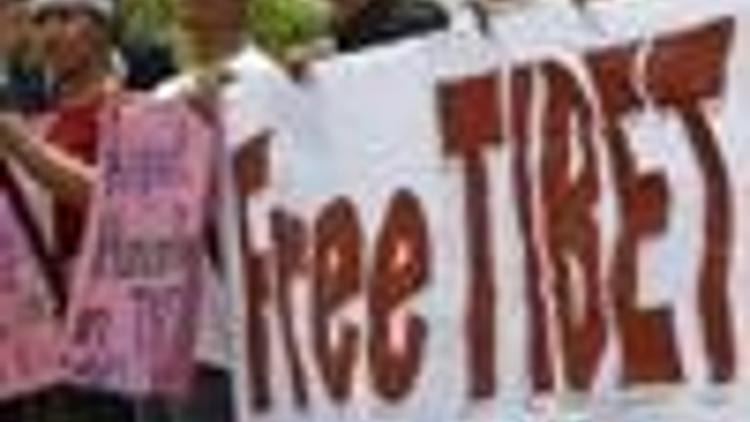Police fire on Tibetan protesters; 8 die
Güncelleme Tarihi:

Police fired on hundreds of protesters in a Tibetan area of western China, killing eight people, overseas activist groups said. State media reported one government official was seriously injured in what it called a riot.
Another Tibetan activist group said Saturday that two monks committed suicide late last month because of government oppression.
The reports indicate that unrest is continuing in China's Tibetan areas despite a massive security presence in place since anti-government demonstrations in Tibet's capital, Lhasa, and neighboring provinces broke out in mid-March.
The protests are the longest and most sustained challenge to China's 57-year rule in the Himalayan region. China's subsequent crackdown has drawn international scrutiny and criticism in the run-up to this summer's Olympic Games.
Police fired on Buddhist monks and ordinary citizens who had marched on local government offices in Garze Tibetan Autonomous Prefecture in Sichuan province near Tibet on Thursday, according to the London-based Free Tibet Campaign and the International Campaign for Tibet.
The protesters were demanding the release of two monks who were detained after 3,000 paramilitary troops searched their monastery and found photographs of the Dalai Lama, Tibet's exiled Buddhist leader, the groups said.
The U.S. government-funded Radio Free Asia said it had unconfirmed reports that up to 15 people were killed and dozens injured in the violence.
Calls to local police and hospitals in the area were not answered Saturday or else officials said they had no information.
The official Xinhua News Agency had no details on deaths or injuries but confirmed that a riot broke out near government offices in Donggu town in Garze.
An official was "attacked and seriously wounded," and police were "forced to fire warning shots and put down the violence," Xinhua said.
On Saturday, the Tibetan Center for Human Rights and Democracy, based in India, said two monks committed suicide last month in Sichuan's Aba County following government oppression. Aba County has been the scene of large protests involving hundreds of monks and citizens.
One monk, identified as Lobsang Jinpa, from the Aba Kirti Monastery killed himself March 27, leaving a signed note saying, "I do not want to live under Chinese oppression even for a minute," the human rights group said.
The group said the second suicide occurred March 30 at the Aba Gomang Monastery, when a 75-year-old monk named Legtsok took his life, telling his followers he "can't beat the oppression anymore."
It was impossible to verify the information since Chinese authorities have banned foreign reporters from traveling to the region.
The Tibet Daily newspaper reported Saturday that the government planned to step up its "patriotic education" campaign, which requires monks to denounce their spiritual leader, the Dalai Lama, and declare their loyalty to Beijing.
"We should strengthen patriotic education so as to guide the masses of monks to continuously display the patriotic tradition and uphold the banner of patriotism," the paper quoted Hao Peng, Tibet's deputy Communist Party Chief, as saying.
Thursday's violence in Sichuan province came when the government attempted to enforce "patriotic education" at the Garze monastery, according to the activist groups.
The chief monk at the monastery had refused entry to a government team on Wednesday and the team returned the next day with the paramilitary troops, leading to the arrests and protests, according to the groups.
Also Saturday, state media reported more than 1 million people had signed an online Chinese petition alleging Western media bias in covering the Tibetan protests.
The petition accuses some Western media organizations, including CNN and the British Broadcasting Corp., of reporting "untrue and distorted" stories on the Lhasa riots.
Calls to CNN and the BBC on Saturday were not immediately returned.
Chinese authorities say 22 people died in anti-Beijing riots that broke out March 14. The Tibetan government-in-exile says up to 140 were killed in the protests and the ensuing crackdown.
Beijing has accused Dalai Lama supporters of orchestrating the violence, a charge the spiritual leader has repeatedly denied.
The government has also been challenged by protests in Xinjiang, a predominantly Muslim province in western China. Chinese state media reported that authorities in the province were blaming a radical Islamic group for demonstrations there last month.
The China News Agency reported on its Web site Friday that Xinjiang leaders accused Hizb ut-Tahrir al-Islami (Islamic Liberation Party) of spreading and posting "reactionary" leaflets and calling for people to demonstrate. Hizb ut-Tahrir, which has been banned in Russia and Central Asia, advocates the creation of a worldwide Islamic state, but has claimed to disavow violence.
Also Saturday, a Cabinet minister of French President Nicolas Sarkozy told a newspaper that Sarkozy could boycott the opening ceremony of the Beijing Olympics unless China releases political prisoners and opens a dialogue with the Dalai Lama.
In an interview with Le Monde, Human Rights Minister Rama Yade set out a list of conditions needed for Sarkozy to attend the Aug. 8 ceremony, the newspaper said.
"Three conditions are essential for him to attend: an end to violence against the population and the liberation of political prisoners; light shed on the events in Tibet; and the opening of a dialogue with the Dalai Lama," Yade was quoted as telling Le Monde.
Sarkozy has previously said he could "not close the door to any possibility" when asked whether he supported a boycott of the ceremony.

